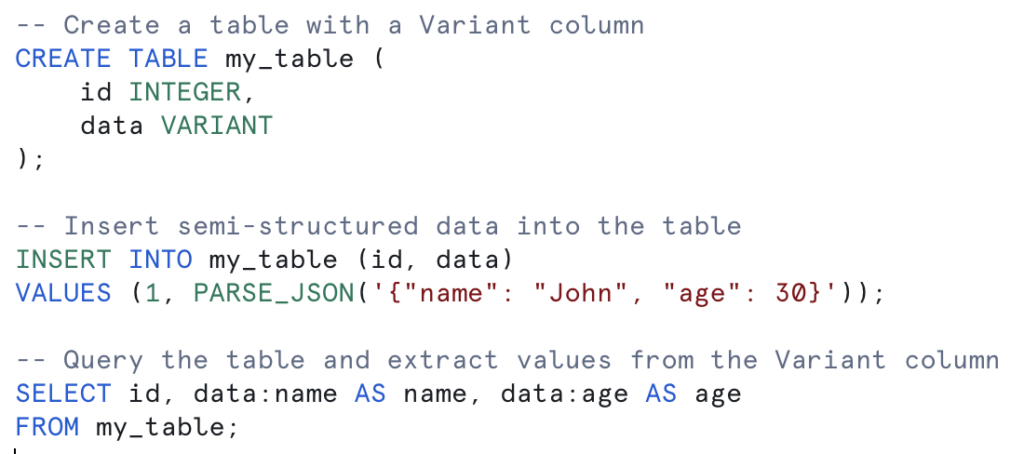In the realm of cloud-based data warehousing, managing both structured and semi-structured data can be a complex task. Snowflake, a leading data warehousing platform, simplifies this challenge with its innovative Variant data type. This feature enables users to seamlessly store and query JSON, XML, Avro, and other semi-structured data formats alongside traditional structured data. This blog post delves into the workings of Snowflake’s Variant data type and how it sets Snowflake apart in the competitive cloud data warehousing landscape.
Understanding the Variant Data Type
Snowflake’s Variant data type is a dynamic and flexible option designed for storing semi-structured data without the need for strict schema enforcement. This type of data, which lacks a predefined structure, includes formats like JSON and XML. By leveraging the Variant data type, users can store and query this data within a Snowflake database column.
How it works
The Variant data type, a cornerstone of Snowflake’s architecture, offers a versatile solution for handling semi-structured data in various formats. When semi-structured data is uploaded to Snowflake, it is automatically parsed and stored as Variant data. This capability enables Snowflake to efficiently manage complex data structures with nested and repeated fields. Notably, Snowflake adopts a schema-on-read approach, allowing the data structure to be determined at query time rather than during the initial load. This flexibility extends to data operations, including filtering, aggregating, and querying. Moreover, developers can access and analyze the stored data using Python and Java scripts. Snowflake’s Variant data type supports a wide range of formats, including JSON, Avro, ORC, Parquet, and XML.
The ability to store and query semi-structured data is becoming increasingly important in today’s data-driven business landscape. Many modern applications generate or consume semi-structured data, such as mobile apps, web services or IoT devices. By supporting the Variant data type, Snowflake allows users to store and analyze this type of data alongside their structured data. In addition, the Variant data type in Snowflake enables users to take advantage of advanced querying capabilities. Snowflake supports querying of semi-structured data using a SQL-like syntax. For example, we can use the dot notation to extract specific values from a JSON object stored in a Variant column.
nowflake’s use of the Variant data type offers several distinct advantages over other data warehousing solutions when it comes to handling semi-structured data. Here are some key benefits:
- Efficient Storage and Retrieval: Snowflake’s Variant data type allows for efficient storage and retrieval of semi-structured data. This is achieved through optimized storage formats and indexing mechanisms, ensuring that queries on semi-structured data are fast and responsive.
- Simplified Querying: Snowflake’s support for querying semi-structured data using SQL-like syntax simplifies the process for users. It eliminates the need for specialized programming knowledge or tools, making it easier for analysts and data scientists to work with semi-structured data.
- Flexibility: The Variant data type in Snowflake is highly flexible, allowing users to store and query data in various formats, including JSON, Avro, and XML. This flexibility enables users to work with diverse data sources without the need for complex transformations.

In this example, we create a table with a Variant column to store JSON data. We then insert a JSON object into the table and use the dot notation to extract specific values from the JSON object in a SQL-like manner.
The support for semi-structured data in Snowflake’s Variant data type offers significant benefits for businesses. Here’s a deeper look at what this means:
- Increased Insights: With the rise of big data, businesses are generating and collecting vast amounts of unstructured and semi-structured data. Snowflake’s Variant data type allows businesses to store and query this data alongside structured data, enabling them to gain deeper insights and make more informed decisions.
- Improved Decision-Making: By integrating semi-structured data into their data warehouses, businesses can gain a more comprehensive view of their operations, customers, and market trends. This enables them to make data-driven decisions that are based on a complete picture of their data.
- Enhanced Data Analysis: Semi-structured data, such as JSON, XML, and Avro, contains valuable information that can provide insights into customer behavior, product performance, and market trends. Snowflake’s support for these data formats allows businesses to analyze this data more effectively and extract valuable insights.
- Efficient Data Management: By storing both structured and semi-structured data in a single data warehouse, businesses can streamline their data management processes. This reduces the need for data silos and simplifies data integration and analysis.
In conclusion, Snowflake’s Variant data type distinguishes it from other cloud-based data warehousing solutions by efficiently managing semi-structured data while maintaining scalability and flexibility. It empowers users to seamlessly import, store, and query diverse data formats like JSON, Avro, or Parquet. This capability is particularly advantageous for applications that leverage multiple data sources. Snowflake’s approach to handling semi-structured data ensures that businesses can derive maximum value from their data assets, regardless of the format or structure.






